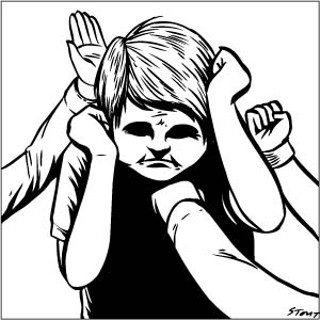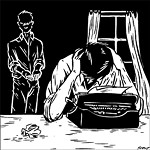Letters at 3AM
Archie and the giant
By Michael Ventura, Fri., Dec. 12, 2003

New York City, 1950. I was 5 years old. I watched a group of boys my age kick another 5-year-old almost into unconsciousness.
The victim of the attack was called the Giant, because he was unnaturally large -- twice the size of most of us, he looked like a 10-year-old. The instigator and prime attacker was called Big Archie, a heavy, vicious bully. In those days, children were still supposed to be "seen but not heard," which in practical terms meant that after school and until sunset, kids ran in packs around our working-class neighborhoods unsupervised and largely unnoticed by adults. At dusk, we would each trudge reluctantly back to our apartments to take on whatever identity we assumed with our families; otherwise, we were feral creatures, left to ourselves. The Giant, however, was not feral. There was something quiet, reserved, and frightened about him. He was excluded by the others and sulked about on his own, in his own world. He wasn't retarded; he was just big. His isolation was no doubt why I felt an affinity with him, though I hadn't courage enough to befriend such a pariah, being something of a pariah myself. I was skinny, sickly, dreamy, and like the Giant usually excluded by the pack -- though unlike him I trailed after it, hoping for its favor. Now and then they suffered my company in their romps, like the time we kicked in an alley's worth of cellar windows or the time we demolished a glass phone booth with garbage-can covers.
Certainly there was something about the fragility of glass that attracted our violence -- we couldn't kick down the walls, but no windowpane was safe from us. How deeply, how unconsciously, how reflexively we hated the world we were born into, without even knowing that what we felt was hate. But what other motive could explain our incoherent need to attack?
Our behavior can't be blamed upon the media. Few had televisions, and TV was strictly family fare then; the movies were gentle by today's standards; the radio played lovesick Hit Parade pap (Perry Como!). Most of us went to church weekly. None of our parents had divorced yet. There were no drugs on the street (not for children anyway). The country was economically hopeful. Yet somehow we felt that the world was not somewhere to live but something to fight.
And we fought it as a pack. How I longed to be part of that pack. I remember the deeply frightening sense of exclusion -- how being an outsider meant that at any moment, for its amusement, the pack might seek you out, terrorize you, even (and it is not too strong a word) torture you. For it was always the pack's purpose to destroy something, someone.
(This may be why, later, history's atrocities shocked but never surprised me. I've learned only one bedrock truth about human nature: In the best and the worst sense, we're capable of anything. "Anything" is what we do. And that's the only thing about us that never changes.)
On this day in 1950 the pack, with me trailing after it, approached the Giant. With no provocation at all, Big Archie started punching him on the arm. The Giant didn't respond physically; he only said, "I can't hit you, you're smaller than me." Big Archie kept punching, first the Giant's arm and then the Giant's stomach. He and the pack taunted the Giant while the Giant kept repeating, "I can't hit you, you're smaller than me." That didn't stop the taunting and the punching. I realize now that the Giant's parents must have lived in fear of him accidentally injuring someone smaller in a fight; since we lived in a world where fighting was considered normal, his parents must have dinned into him that under no circumstances could he hit anyone smaller than himself. So the Giant repeated his mantra, even when doubled over by stomach punches: "I can't hit you, you're smaller than me." When he finally fell down, Big Archie took to kicking him. The others joined in. I remember clearly, but even now cannot fully describe, the depth of my horror as I stood aside and watched.
My horror took the form of a flood of simultaneous perceptions: an indelible vision of the raw cruelty of my kind; a paralyzing sense of my own utterly naked helplessness, magnified by the certainty that there was no one to whom I could turn for help; waves of acute, inarticulate shame; and a profound admiration for the Giant. I had then what I realized, much later as an adult, was the first independent thought of my life: "The Giant is very brave."
It may surprise you when I say that I've since considered this my first experience of soul -- that is, it was the first time I remember feeling viscerally, mentally, emotionally, and inescapably connected to everything and everyone around me, while feeling, at the same time, a sense of privacy so deep and unassailable that "loneliness" does not begin to describe it.
Of course at the age of 5 I had no words to articulate this sense of connection and its counterpart, my sense of profound isolation. But the sight of such terrible, unforgettable, and unprovoked cruelty made me both aware and afraid of something livid and voracious in my fellow creatures. My sense of helplessness (which I defined as cowardice) made me equally aware of something inescapably vulnerable in myself. My shame was, I realize now, partly rooted in a sense of responsibility -- for I was ashamed not only of the others but for the others, which meant they were not Other: Though I took no part, they were committing an action that stained me, too, a stain that I would have to find a way to redeem in my own behavior. And I was proud of the Giant -- his courage, his dedication to what can only be called a principle of fairness, his determination not to sink to Big Archie's level were beautiful to me. I remember that clearly ... the feeling that he was beautiful, a beautiful being.
It's no good telling me that 5-year-olds can't feel such subtleties. I felt them inarticulately, but I felt them. The indelibility of the memory, how it has stayed with me and instructed me all these years, testifies to my claim. The experience instigated in me a need to keep returning to it and to find its meaning -- the meaning that swelled out of the rich, roiling, inarticulate awareness that filled me in those moments. All of what I'm saying now was compressed for me then in the five simple words that came to me on the spot and have never left me: "The Giant is very brave."
As for feeling at the same time an almost dizzying sense of my own aloneness, privacy, and loneliness -- it is to say that feeling these Others so viscerally also made me feel, just as deeply, my Self. My sense of Self cohered for the first time through the experience of identifying so closely with these Others, the pack as well as the Giant. And this is where I go for, not a definition, but a conception of that troubling, thrilling word, "soul."
Every culture in every era has had a word that we translate as "soul," and each has had just as much trouble defining it as we do. But the word has been necessary because it describes not an entity but an experience: the experience of something deep within us that is unspeakably private and our own -- yet at the same time this feeling connects us to everything and everyone around us in the most concrete and unavoidable ways. It is the experience that leads us to posit, to believe in, the entity: soul. For the experience, though felt as intensely personal, feels larger than the realm of the personal. In an experience of soul we feel the Self as part of All. It is the experience of connecting what seems otherwise, in our innate isolation, unconnectable. In such an experience we feel larger and deeper and older than ourselves, than our persona, than our personality. For we are having an experience that can't be explained by the combination of all the little bits we know about ourselves, our personalities, our psychologies. And so we conceive of an entity within us that is larger, deeper, older -- the soul. Whether this entity has an independent existence, no one knows for sure; yet all cultures have needed to conceive of such an entity, as though our lives depended upon it.
Perhaps I owe even Big Archie a debt. For I would no longer trail after the pack, seek its favor, join its destructions -- though I would long carry its core conviction: that the world isn't somewhere to live but something to fight. I suppose I haven't shaken that conviction even now. But I had felt the experience of soul, which made one thing, at least, clear: If I had a task thereafter it was to let myself be haunted by my soul, haunted and instructed. ![]()
This is the first of a three-part series, an expanded version of an article I published in September's Psychotherapy Networker.









